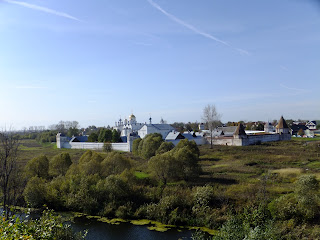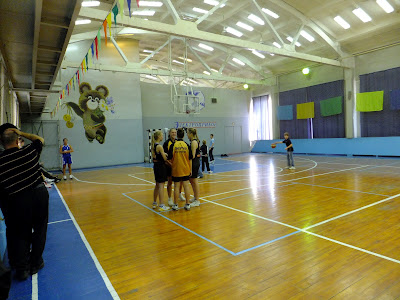You don't know Russia until you've been to a Russia dacha. Only out in the country, surrounded by a bountiful garden and in the company of friends, can you really experience Russian hospitality, cuisine, and culture. A dacha is a country house, and usually these are places that people visit only in the summer, although some people live year-round at their dachas. Dachas are the compliment to small apartments that are home for most Russians; a dacha is a place to be outside, grow fruits and vegetables, and relax with friends.
This weekend, my host family had guests in town, and we all went to see a great play at the Vladimir Drama Theater on Saturday night, and then we came back to our apartment and laid a great dinner party with lots of great food and conversation. Then around noon today we went to the dacha of one of the family's good friends. I promised to make chili, so we brought all the ingredients to the dacha and cooked in the kitchen (I wanted to cook chili on the wood stove outside, but it would have taken far longer to get the soup boiling). The chili turned out quite well, although it wasn't nearly as good as mom makes, especially because what I thought was chili powder was actually cayenne pepper (in my defense, the label said "чили," which would suggest that the spice inside would be chili powder). After I had added five palm-fulls--my approximate way of measuring out a tablespoon--of this spice, I tasted the soup and nearly spat it all over the kitchen. I don't mind hot food, but this was nearly inedible. So I skimmed a lot of the pepper off the top and added a lot of water. I also used some amazing tomatoes that my host family had preserved--way better than the Delmonte canned stuff. The resulting soup was quite tasty, albeit a bit too watery. Next time I'll read labels more carefully.
Anyway, all this is to say that we had a great time at the dacha. In addition to chili, we had salyodka pod shuboi (Herring under a coat), which is delicious salted herring covered in finely chopped potatoes, beets, onions, and mayonnaise; we also ate the classic Russian potato salad olivye and pork chops. All this was accompanied by fresh vegetables, fruits, and herbs (there is cilantro in Russia!) from the garden and was washed down with vodka and wine. After the meal, I went to the neighborhood well with the host, hoisted up a bucket of pure, cold water, and then fired up the classic wood-fueled samovar. When the water boiled, had some amazing tea--the teapot was filled with tea leaves, herbs, and apple wedges.
All this food wasn't for any particularly special occassion, that is, they didn't go all out because I was there. And really, food isn't the centerpiece of any Russian occassion (although it is hard to understate the passion with which Russians approach food). The most important part of any Russian get-together is the company. Stories, anecdotes, long quotes from Pushkin and Yesenin, singing, and drawn-out toasts are the staple. All in all, it's a perfect way to spend a Russian Sunday. Here are a few pictures:































